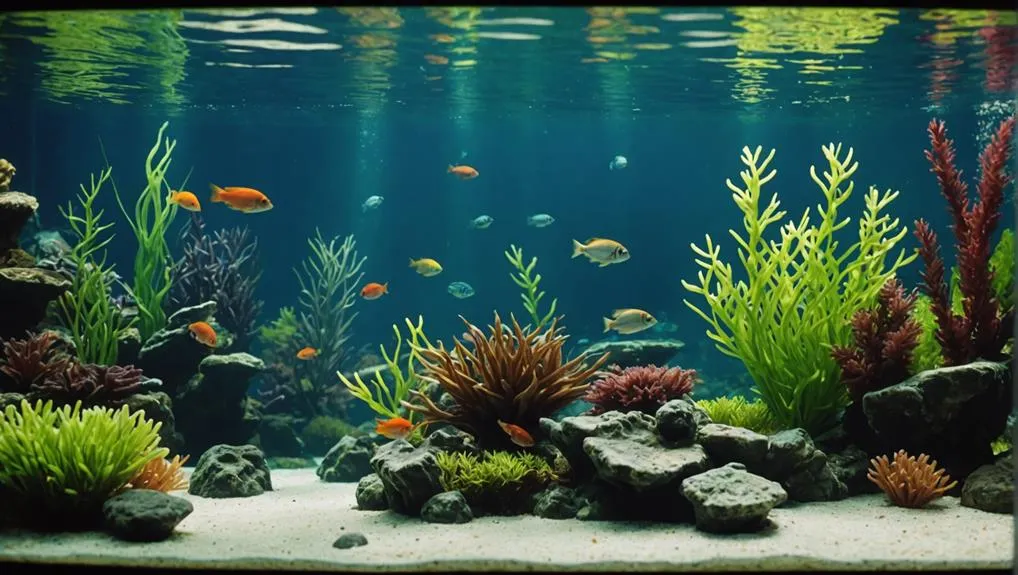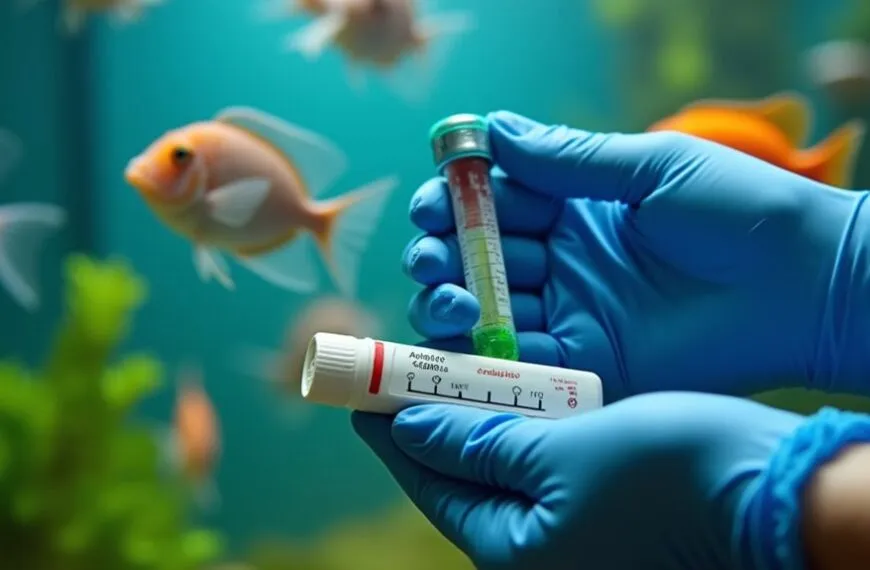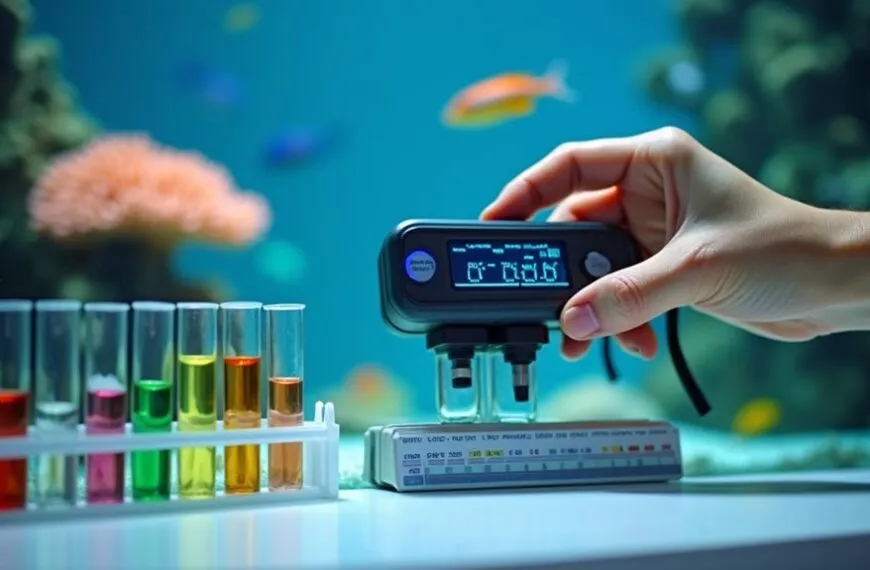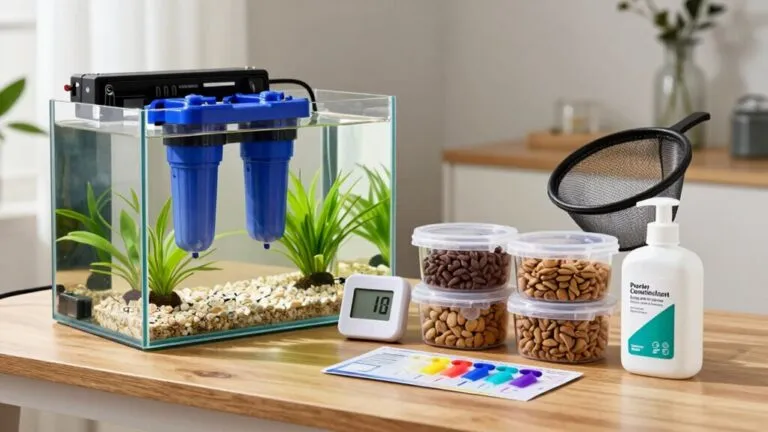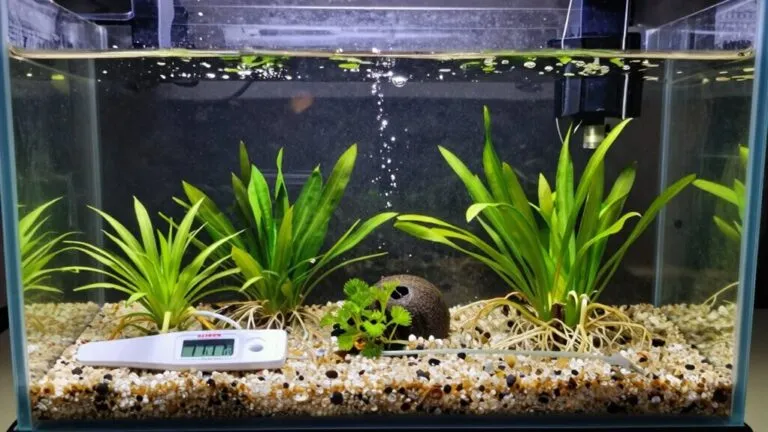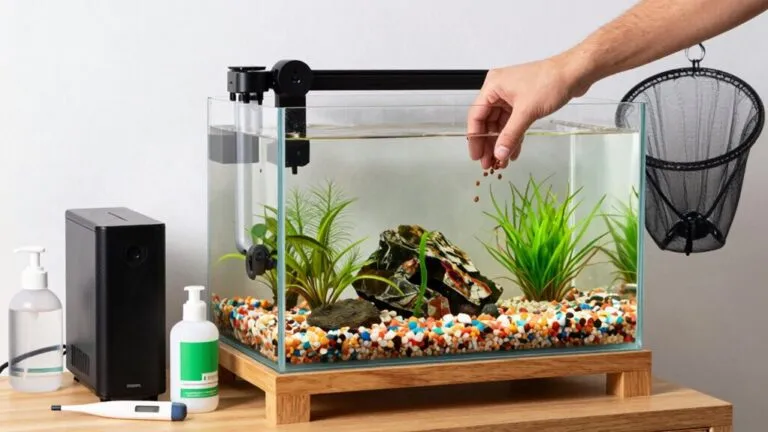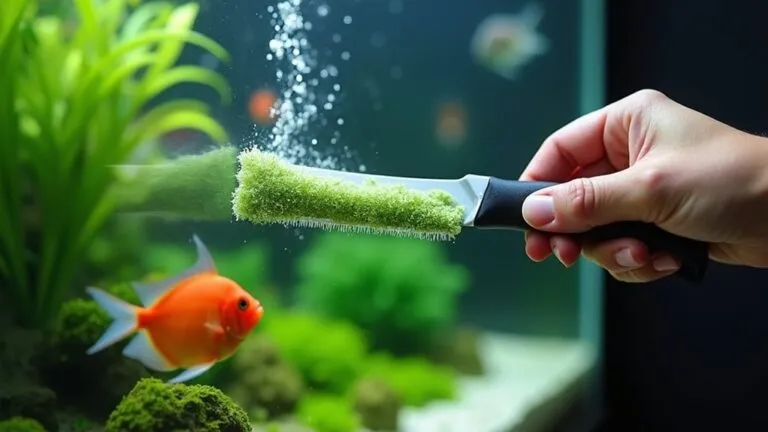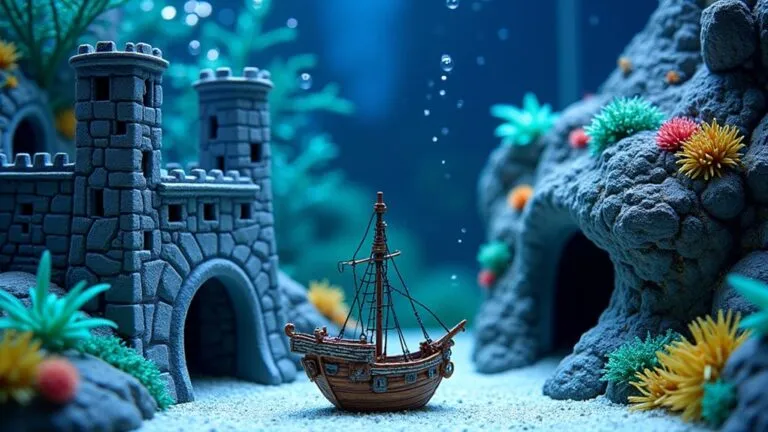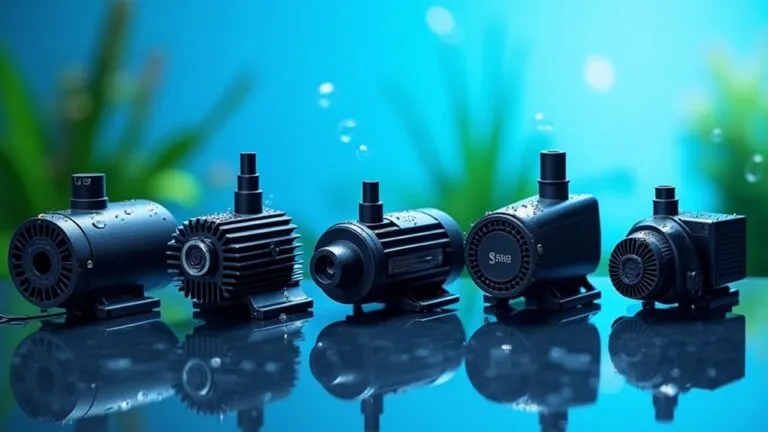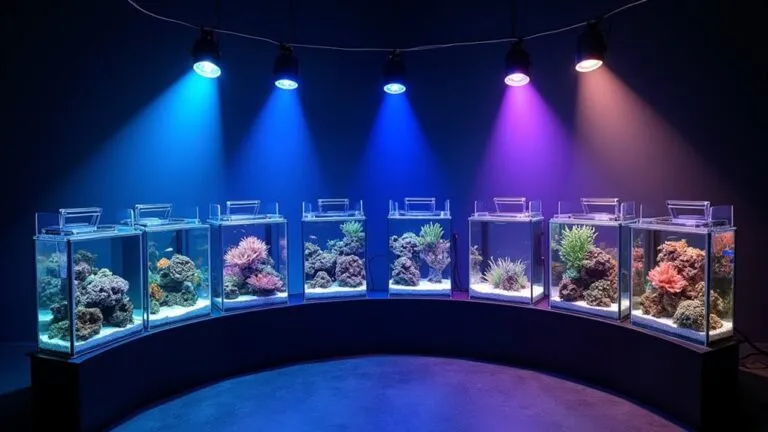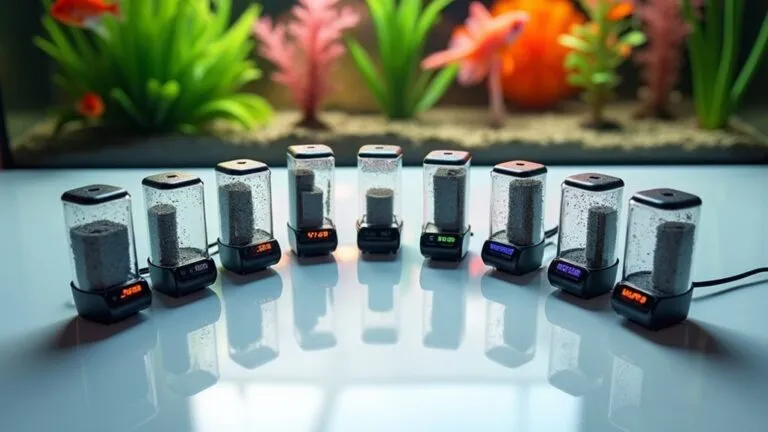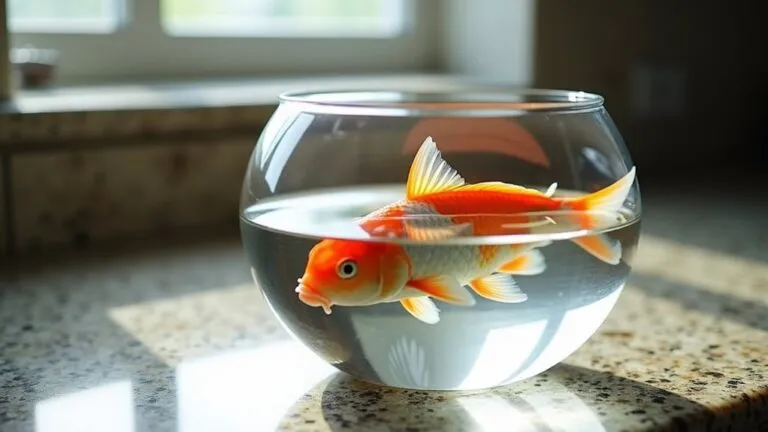Maintaining aquarium water quality is essential because it keeps your fish healthy and happy, preventing them from turning into little floaters! By monitoring pH levels and keeping ammonia and nitrite at zero, you're basically setting up a fishy five-star hotel. Regular water changes and testing help you catch issues before they spiral out of control, like algae blooms or stress-induced fish freak-outs. Plus, a well-maintained environment supports beneficial bacteria and promotes better growth and breeding. So, if you want your underwater friends to thrive and put on a show, there's more to uncover on how to keep that water sparkly clean!
Contents
Significance of Water Quality
When it comes to maintaining a healthy aquarium, the significance of water quality can't be overstated. You want your fish to thrive, right? Poor water quality can lead to stress, disease, and even a rise in mortality rates. By regularly monitoring water parameters like pH, ammonia, nitrite, and nitrate, you're taking vital steps to keep your aquatic friends happy. Did you know that ammonia levels above 0 ppm are toxic? Keeping an eye on these numbers is key to avoiding fish drama!
Healthy water quality supports a stable nitrogen cycle, which prevents the build-up of harmful compounds like ammonia and nitrites. That means fewer worries for you and a happier home for your fish.
Plus, when water conditions are just right, your fish are more likely to breed successfully, ensuring the next generation swims with joy. When you maintain a clean environment, you'll notice your fish acting less stressed, spending less time hiding, and more time exploring their underwater world.
Key Water Quality Parameters
Maintaining proper water quality is vital, and understanding key parameters helps you achieve that goal. pH levels, ammonia, nitrite, and nitrate concentrations all play significant roles in your aquarium's health.
You'll want to keep your pH between 6.8 and 7.8 to support your tropical fish and keep them happy. Trust me; no one likes a stressed fish!
Ammonia and nitrite levels should always be zero. Even tiny amounts can be toxic, leading to serious health problems for your fish.
Nitrate levels are also important; aim to keep them below 40 ppm to avoid algae blooms and stressed-out fish.
Don't forget about general hardness (GH) and carbonate hardness (KH). These factors help maintain stable water conditions, support your fish's life processes, and keep those pesky pH fluctuations in check.
Regular testing of these water chemistry parameters is key. It helps you ensure a balanced ecosystem and catch any potential issues early.
Recognizing Poor Water Quality
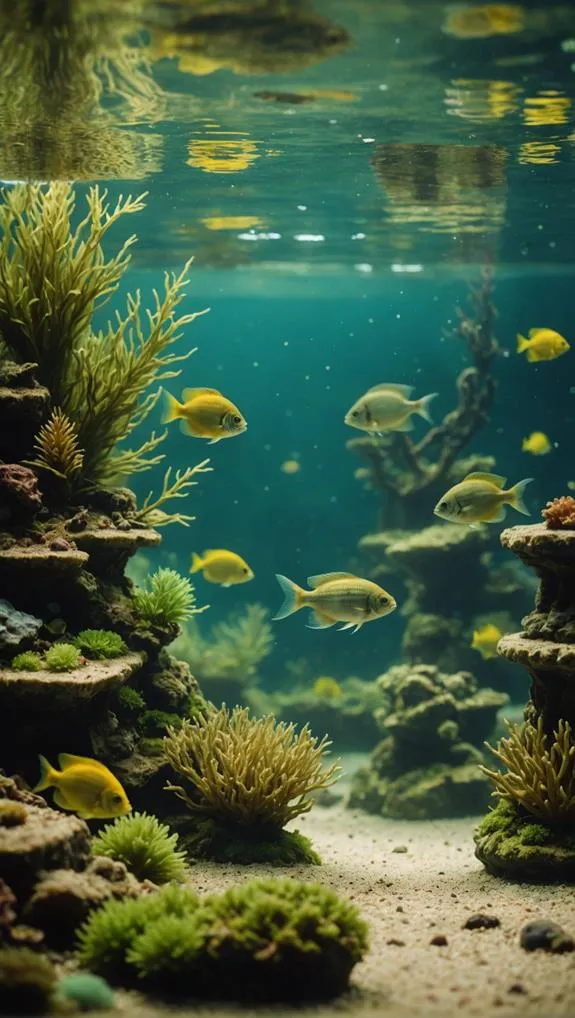
Poor water quality can sneak up on you if you're not paying attention to your fish's behavior and the clarity of the water. Erratic swimming, like darting around or hiding in corners, often signals that your fish are stressed—usually due to poor water quality. You want to keep an eye on those ammonia levels, too; they should be at zero. Anything above that can be toxic and harmful to your fish's health.
Watch out for algae growth and cloudy water. These can indicate bacterial blooms, blocking light and oxygen, which are vital for your fish. If you notice your fish gasping at the surface, it might mean there's not enough dissolved oxygen in the water. This could be a result of inadequate water quality management.
Regularly monitoring water and observing your fish's behavior is key. These simple actions can help you catch potential issues before they escalate into major problems.
Effective Maintenance Strategies
To keep your aquarium thriving, regular water testing and scheduled water changes are your best friends.
Think of them as your fish's personal health check-ups—keeping things fresh and clean while making sure harmful substances don't crash the party.
Plus, those water changes not only help your fish feel their best, but they also allow you to show off your awesome aquatic setup!
Regular Water Testing
Consistently testing your aquarium water is essential for keeping your aquatic environment healthy and stable.
Regular water testing helps you monitor important parameters like pH levels, ammonia, and nitrite levels, which can significantly impact your fish's health. Think of it as giving your aquatic friends a routine check-up.
You can find various test kits, from easy-to-use strips for quick checks to more advanced digital devices for accurate readings. These tools make it easy to keep an eye on water quality and ensure everything stays in tip-top shape!
By checking your water regularly, you'll catch potential issues early, like ammonia spikes or pH fluctuations. Nobody wants stressed-out fish, right?
Plus, tracking water quality trends over time helps you understand how your tank behaves, making it easier to tailor your maintenance strategies.
To keep everything running smoothly, establish a regular testing schedule—ideally every week or every other week.
This way, you can make sure all your water parameters remain within safe ranges, promoting a thriving aquarium. After all, happy fish make for a happy aquarium!
Scheduled Water Changes
Regularly scheduled water changes are a vital part of maintaining a healthy aquarium. By changing 10-15% of the water weekly, you help dilute harmful substances and replenish essential minerals, keeping your fish's home clean and healthy. Think of it as a refreshing spa day for your aquatic friends!
These water changes play a crucial role in fish health. They prevent the buildup of toxic ammonia and nitrites, ensuring these levels stay at zero. This helps your fish thrive and live longer.
Plus, by consistently removing organic waste and excess nutrients, you reduce the risk of pesky algae blooms, allowing your tank to sparkle.
Don't forget, balancing nitrates below 40 ppm is essential too. It minimizes stress on your fish and keeps them happy.
Sticking to a strict schedule for water changes not only supports biological filtration but also fosters a thriving aquatic ecosystem.
Essential Testing Methods

Frequent water testing is vital for maintaining a healthy aquarium environment. You want to keep your fish happy and thriving, and that means regularly checking water quality. Testing helps you catch any potential issues before they become serious problems.
Here's what you should focus on:
- Ammonia Levels: These should always be at zero. Even tiny amounts can be toxic to your fish.
- Nitrite Levels: Like ammonia, nitrite should also be at zero. It's a sneaky little culprit that can harm your aquatic friends.
- Nitrate Levels: Ideally, these should stay below 40 ppm. High nitrate levels can stress your fish, leading to illness.
- pH Levels: Keep an eye on pH as well, ensuring it stays within a suitable range for the species you keep.
With regular water testing, you can maintain optimal conditions for your fish and prevent toxic buildups.
Test kits range from simple strips to more advanced digital devices, so you can choose what works best for you. By being proactive, you're not just serving your fish; you're creating a beautiful, thriving ecosystem that everyone can enjoy!
Tools for Water Quality Monitoring
To maintain a thriving aquarium, it's crucial to have the right tools for monitoring water quality. Think of these monitoring tools as your aquarium's best friends.
You'll definitely want ammonia and nitrite test kits on hand, since these nitrogen compounds can be toxic to fish. Ideally, you're aiming for safe levels of zero—no pressure, right?
Don't forget about nitrate testing kits! They help you keep track of waste breakdown, with levels below 40 ppm being safe. It's like checking off a to-do list for your aquatic pals.
And if you want to simplify your life, digital water testers make it easy to measure temperature and hardness with just a glance—no more squinting at tiny color charts!
Regularly using these tools can help you catch potential water quality issues before they become big problems.
After all, your fish deserve a healthy environment to thrive in. So grab those test kits, stay on top of water quality, and give your aquatic friends the best chance to flourish. Remember, happy fish equal a happy you!
Long-term Benefits of Maintenance

When you keep up with your aquarium's water quality, you're not just playing it safe; you're giving your fish a shot at a much longer, healthier life.
Healthy fish can live up to 50% longer, and who wouldn't want that?
Plus, a stable ecosystem means your tank stays balanced, reducing the chance of stress and illness—because nobody wants their fish feeling under the weather!
Enhanced Fish Health
By maintaining optimal water quality, you significantly enhance the health and longevity of your fish. When you keep things balanced, your aquatic friends can thrive, leading to a more vibrant aquarium. Here's how proper maintenance helps:
- Reduced Stress: Healthy water quality means less stress for your fish, which boosts their immune function and lowers disease risk.
- Improved Growth: Stable pH and low ammonia levels lead to better growth rates and reproductive success, making your fish happy and healthy.
- Effective Filtration: A good filtration system is crucial for preventing harmful toxins, ensuring a safe environment for your fish to swim freely.
- Higher Oxygen Levels: Enhanced water quality increases dissolved oxygen, vital for fish survival, resulting in more active and engaging behaviors.
Regular partial water changes and attention to your fish's environment will keep them lively and content.
With consistent monitoring, you not only limit the risk of mortality but also create a beautiful and stable aquarium.
Stable Ecosystem Balance
Achieving a stable ecosystem balance in your aquarium is essential for the long-term health of your aquatic environment. When you maintain water quality, you're not just keeping things clean; you're ensuring a thriving home for your fish and plants.
A balanced nitrogen cycle is crucial because it prevents toxic ammonia and nitrites from building up, which can cause chaos among your aquatic friends. By regularly testing and adjusting your water, you can keep pH levels in the sweet spot of 6.8 to 7.8. This promotes a healthy atmosphere for your fish, helping them feel less stressed and more at ease.
Plus, keeping dissolved oxygen levels stable through proper filtration and water changes supports not just survival, but also natural behaviors and breeding.
Don't forget the power of live plants! They not only stabilize nutrient levels but also provide a cozy habitat for your fish. By preventing those pesky algae blooms caused by excess nitrates and phosphates, you're protecting your ecosystem's integrity.
Frequently Asked Questions
Why Is Water Quality Important for Aquatic Life?
Water quality's vital for aquatic life as it ensures a balanced environment. You maintain species health by controlling toxicity and ensuring adequate oxygen levels, fostering biological balance that supports thriving aquatic ecosystems.
Why Is Water Quality Essential?
You might think water quality's a hassle, but it's vital. Proper water chemistry, effective filtration systems, balanced pH, controlled ammonia levels, and thriving beneficial bacteria create a healthy environment for your aquatic friends to thrive.
How Do You Maintain the Water Quality in an Aquarium?
To maintain water quality, you'll want to use effective filtration methods, regularly test water parameters, ensure chemical balance, cycle your tank properly, and select appropriate substrate. This keeps your aquarium thriving for your aquatic friends.
Why Is It Important to Maintain a Fish Tank?
Maintaining your fish tank is crucial for fish health and a thriving tank ecosystem. Regular water testing, effective filtration systems, and algae control keep your aquatic friends safe, happy, and vibrant in their beautiful environment.
Final Thoughts
So, while you might think your fish don't mind a little murky water, trust me, they do! Keeping your aquarium water clean isn't just a chore; it's vital for your aquatic buddies' happiness and health. By regularly testing and maintaining water quality, you're not just preventing a fishy disaster, you're creating a thriving underwater paradise. Plus, who doesn't want to show off a sparkling tank? Dive into water care, and watch your fish thank you with joyful wiggles!

